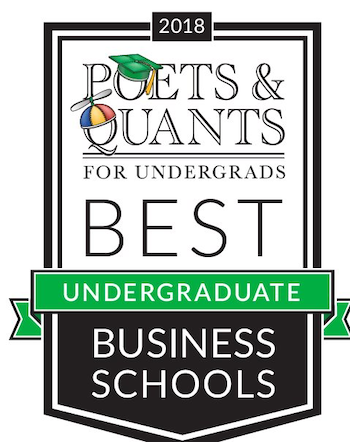Making the expense of college worth it by finding a good job after graduation is the foremost concern for just about every parent, in no small part because they will be footing whatever portion of the overall bill isn’t covered by grants or loans. Well, attention parents: As your daughter or son contemplates where to attend college, should they opt for business school we have the data you need.
 B-school has always been an attractive option for parents and students eyeing the bottom line. At the top schools, the data show convincingly that an undergraduate degree pays off. But do grads get the jobs they really want in their desired industries and target companies? As part of our annual ranking of undergraduate business schools, we survey alumni about whether they found work three months after graduation in the industries they desired and for the companies they targeted — in other words, did they get the kind of position they sought, or did they have to settle for something a little less desirable?
B-school has always been an attractive option for parents and students eyeing the bottom line. At the top schools, the data show convincingly that an undergraduate degree pays off. But do grads get the jobs they really want in their desired industries and target companies? As part of our annual ranking of undergraduate business schools, we survey alumni about whether they found work three months after graduation in the industries they desired and for the companies they targeted — in other words, did they get the kind of position they sought, or did they have to settle for something a little less desirable?
What we found was that once again, the industry test was easier to pass. At every one of the 88 schools we surveyed, a majority found work in the industry they desired, with 21 schools boasting better than 90% employment rates and another 32 schools having 85% or higher rates. Last year, 27 schools were above 90%, and 29 more schools were above 85%.
TWO SCHOOLS ACHIEVE PERFECT SCORES: CORNELL JOHNSON & UNC
Last year, one school topped the entire list with a perfect 100% score for graduates finding work three months later in the industry they’d chosen: Wharton. This year Wharton slipped to 12th, at 93%, while two schools vaulted into first with perfect 100% marks: Cornell University Charles H. Dyson School of Applied Economics & Management and University of North Carolina at Chapel Hill Kenan-Flagler Business School. They were closely followed by Washington University’s Olin Business School (98.1%), the University of Pittsburgh (97.0%), and Villanova University (95.6%).
Cornell, UNC, and WashU are elite schools, regularly in the upper echelons of our rankings in both undergraduate and graduate business education. Villanova ranked No. 8 on this year’s undergrad list, up from 17th the year before. But the University of Pittsburgh College of Business Administration ranked only 23rd this year, up from 26th. So what are they doing right at Pittsburgh? Boasting a “globally focused curriculum and exceptional career development support,” Pitt’s innovative “Mentoring Match” program allows alumni to offer career advice and networking support to business students; more than 500 alumni from around the world have signed up to help current students, connections that help take Pitt students “from the classroom, to the city, to the world.”
Even at the bottom of this year’s list of employment rates in desired industries, most students find work where they want. North Carolina-Wilmington, last among 88 schools, still had a 61.8% alumni satisfaction rate.
LANDING A JOB WITH A SPECIFIC FIRM: THE BIG TEST
Things get a little hairier when students target specific companies — but here again there are remarkable success stories. Last year, no school notched a rate above 90%; this year, four schools did, with William & Mary topping all schools at 95.8%. After the Raymond Mason School of Business came Wake Forest (92.8%), Texas Christian (91.5%), and The College of New Jersey (90.3%). Nine more schools had 85% or greater rates in this metric.
Schools that do well in helping their graduates gain a job at a specific company have career management centers that go the extra mile to coach and mentor students and develop relationships with companies. For example, Minnesota Carlson, which was fifth on both last year’s and this year’s lists at 84.2% and 88.7%, respectively: Students are assigned advisers who work with them from orientation through graduation, and the school’s world-class Undergraduate Business Career Center offers a required career skills course, career discovery, a mentorship program, and state-of-the-art employment website. It helps that Carlson has 18 Fortune 500 companies in its backyard.
In fact, most of the leading business schools have an excellent track record of helping their graduates achieve the more challenging goal of finding work with a specific company. Alumni at all but eight schools of the 88 surveyed reported 60% or greater rates of success in that mission; only three schools were below 50%, with the worst rate coming at the UC-Irvine Merage School of Business (35.3%). Last year’s low was at Hult International Business School, which posted a 35.7% alumni satisfaction rate; this year Hult jumped to 56.3%, good enough to top four other schools.
(See the following pages for how schools fared on helping graduates gain jobs in their targeted industry and company.)












Questions about this article? Email us or leave a comment below.